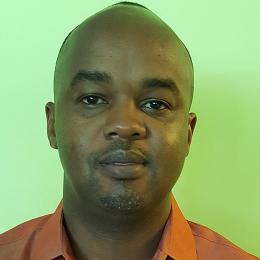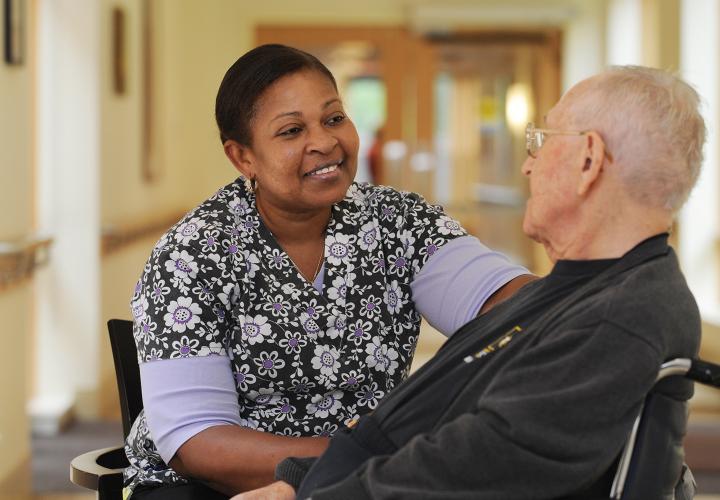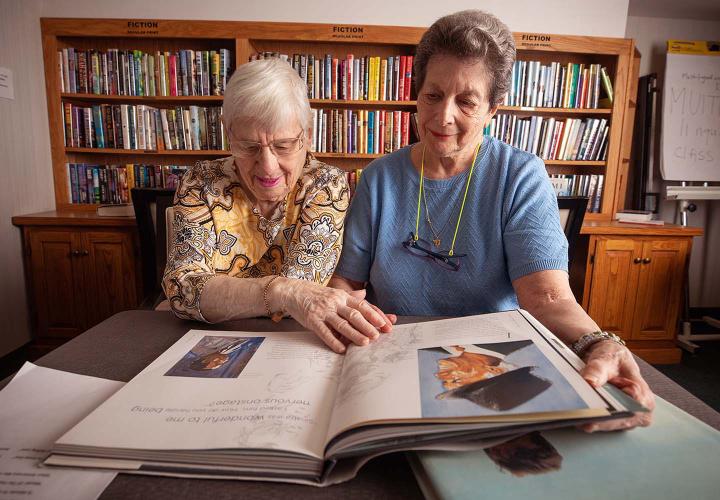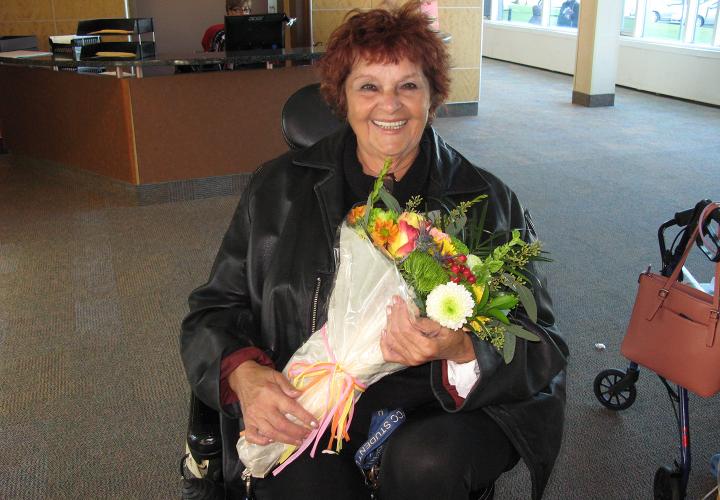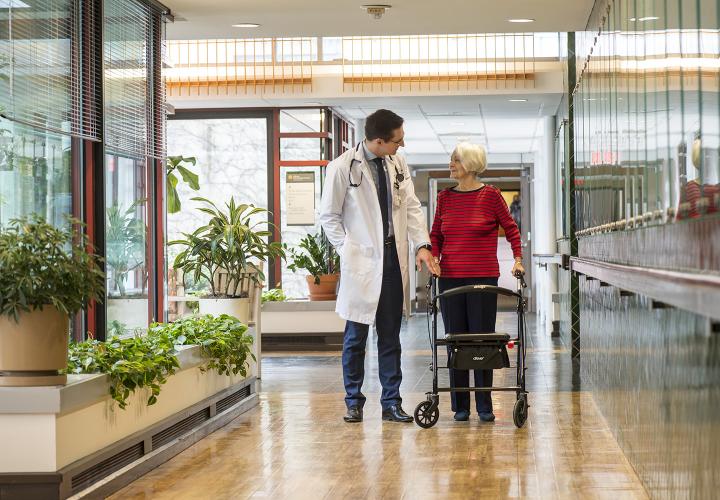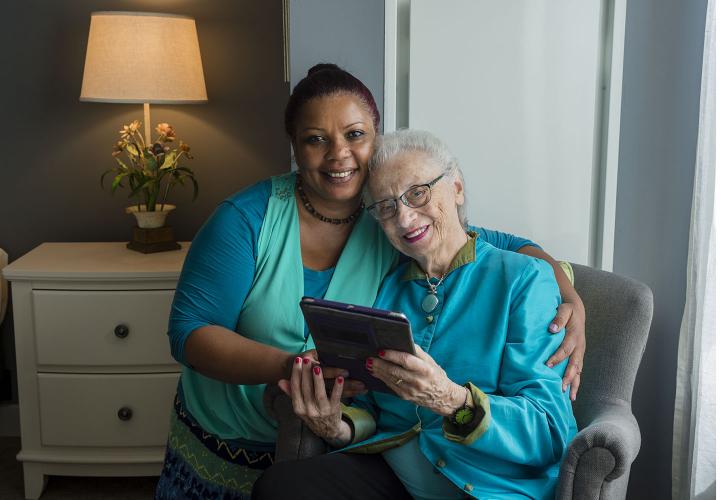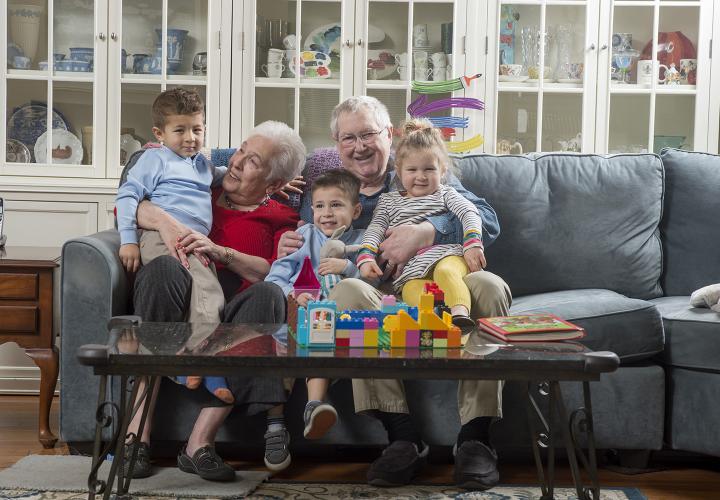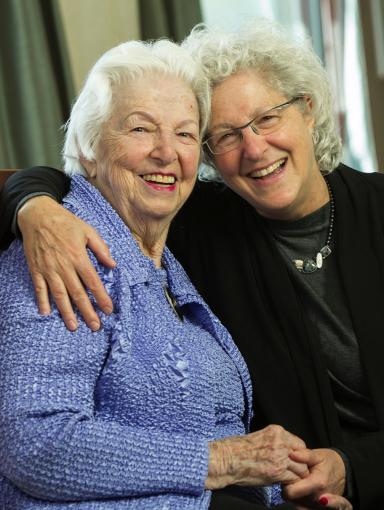Plan Your Visit to Boston or NewBridge
Visiting Hebrew Rehabilitation Center - Boston
We look forward to welcoming you to our flagship campus, Hebrew Rehabilitation Center - Boston, located in the city’s Roslindale neighborhood.
Hebrew Rehabilitation Center-Boston
1200 Centre Street
Boston, MA 02131
General Inquiries: 617-363-8000
Admissions: 617-363-8372
Volunteer: 617-363-8421
Due to an increase in internal respiratory virus activity, face masks are currently required at HRC-NewBridge and HRC-Roslindale for all visitors and employees. The decision to implement masking at this time was made to optimize staffing, reduce transmission of upper respiratory illnesses and maintain patient activities and gathering throughout the winter virus season. Visitors are required to wear a face mask in all patient care, common, and shared areas. This includes but is not limited to the hallways, activity rooms, and the Conservatory or Synagogue. Visitors are highly encouraged to wear a mask in patient rooms; however, masks will not be required in patient rooms at this time. Visitors are required to mask upon exiting a patient’s room.
Patients (as able to) are required to wear a mask upon exiting their respective units/floors. Patients are not required to wear a mask on their respective unit/floor unless the unit is restricted due to a respiratory illness.
Our Infection Control Team will continue to monitor internal and external respiratory virus activity and adjust masking protocols based on the risk. In the meantime, please wear a face mask upon entering the building; they will be available at the entrances. As always, please perform hand hygiene frequently and if you have any signs or symptoms of infection please postpone visitation.
Thank you for your cooperation, patience, and support and we will continue to provide updates as we have them.
Guest parking spots are available at our upper entrance off of Walter Street.
Hebrew Rehabilitation Center offers two entrances:
- Our lower B1 entrance on Centre Street
- Our upper entrance off of Walter Street, which offers a small amount of guest parking spaces.
Our front desk staff at either entrance can direct you to the patient or department you wish to visit.
You may prefer to use the B1 entrance on Centre Street for the following services, which are located on the ground level:
- Outpatient Care
- Deanna and Sidney Wolk Center for Memory Health
- Great Days for Seniors Adult Day Health Program
Our flagship campus offers physical spaces and convenient amenities to make patients and visitors feel at home. Learn more about our common areas, dining options, gift shop, and other services.
Contact our front desk to obtain the most accurate address for the recipient. Before sending outside food, plants, or flowers, please contact the patient’s floor coordinator to learn of any restrictions. Latex balloons are not allowed due to latex allergies.
Pets may be allowed in certain areas of Hebrew Rehabilitation Center, following a health verification process for the animal. A Pet Visitation Health Certificate must be completed by your veterinarian and submitted for approval. Contact our security desk for details. Pets are not allowed in our post-acute care units.
We count on our volunteers to improve the quality of our patients’ lives in a variety of ways. Learn more about becoming a Hebrew Rehabilitation Center volunteer and apply online here.
Visiting Hebrew Rehabilitation Center - NewBridge
We look forward to welcoming you to Hebrew Rehabilitation Center - NewBridge, located in the Gloria Adelson Field Health Center on the NewBridge on the Charles campus, on the Dedham/Needham line.
Hebrew Rehabilitation Center-NewBridge
7000 Great Meadow Road
Dedham, MA 02026
General Inquiries: 781-234-9700
Admissions: 617-363-8372
Volunteer: 781-234-9317
Due to an increase in internal respiratory virus activity, face masks are currently required at HRC-NewBridge and HRC-Roslindale for all visitors and employees. The decision to implement masking at this time was made to optimize staffing, reduce transmission of upper respiratory illnesses and maintain patient activities and gathering throughout the winter virus season. Visitors are required to wear a face mask in all patient care, common, and shared areas. This includes but is not limited to the hallways, activity rooms, and the Conservatory or Synagogue. Visitors are highly encouraged to wear a mask in patient rooms; however, masks will not be required in patient rooms at this time. Visitors are required to mask upon exiting a patient’s room.
Patients (as able to) are required to wear a mask upon exiting their respective units/floors. Patients are not required to wear a mask on their respective unit/floor unless the unit is restricted due to a respiratory illness.
Our Infection Control Team will continue to monitor internal and external respiratory virus activity and adjust masking protocols based on the risk. In the meantime, please wear a face mask upon entering the building; they will be available at the entrances. As always, please perform hand hygiene frequently and if you have any signs or symptoms of infection please postpone visitation.
Thank you for your cooperation, patience, and support and we will continue to provide updates as we have them.
Follow signs to the Health Center. Ample parking is available outside our entrance at 7000 Great Meadow Road.
As you enter through the first set of sliding doors, turn left for outpatient care or right for inpatient rehabilitative services and long-term chronic care. Our front desk staff will direct you to the location of the patient you wish to visit.
Hebrew Rehabilitation Center on the NewBridge on the Charles campus in Dedham offers physical spaces and convenient amenities to make patients and visitors feel at home. Learn more about our common areas, dining options, gift shop, and other services.
Please note that Nosh, our deli-style dining option in the NewBridge community center, is currently open to visitors for takeout only.
Contact our front desk to obtain the most accurate address for the recipient. Before sending outside food, plants, or flowers, please contact the patient’s floor coordinator to learn of any restrictions. Latex balloons are not allowed due to latex allergies.
Individual pets may be allowed in certain areas of Hebrew Rehabilitation Center, following a health verification process for the animal. A Pet Visitation Health Certificate must be completed by your veterinarian and submitted for approval. Contact our security desk for details. Pets are not allowed in our post-acute care units.
We count on our volunteers to improve the quality of our patients’ lives in a variety of ways. Learn more about becoming a Hebrew Rehabilitation Center volunteer and apply online here.
Patient and Family Advisory Council Report
Each year, Hebrew Rehabilitation Center issues a report about the activities, recruitment, and engagement of our Patient and Family Advisory Council. You can view a copy of the report on Health Care for All's website.
